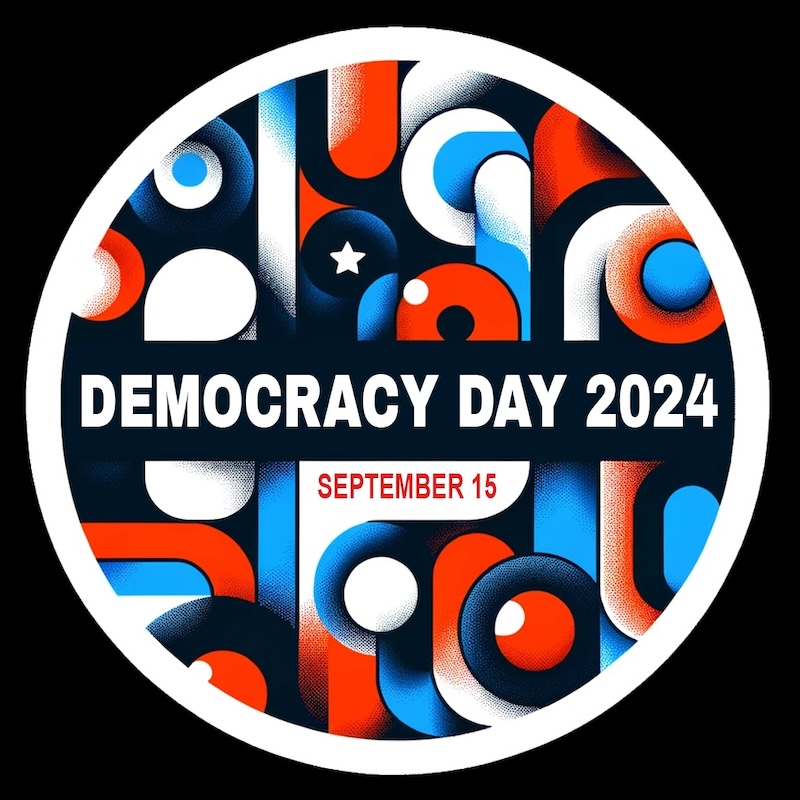Fueled by Distrust in Government, Gen Z Still Wants to Fix America – or at Least Central Texas
Young organizers say local focus is the way forward
By Maggie Quinlan, Fri., Aug. 23, 2024
As students return to Austin, we’re barreling toward the November 2024 election. People young enough to have experienced major brain development in the shadow of Donald Trump’s presidency have a complicated relationship with America and politics – Gen Z doesn’t trust institutions, but is motivated to try to fix them anyway. That’s tough. But the good news is, getting involved in local policy change is actually – like, actually – rewarding. In this week’s issue, we fill you in on a few places to start.
Sixteen years ago in Laredo – a border town and a blue dot in Texas – 8-year-old Sam Benavides asked her mom who she was voting for. She answered: I’m not going to vote.
“I don’t know what compelled me to try and pressure her, but I was like, 'No, you should vote.’ And she was like, 'Well, you do the research and you tell me who to vote for.’”
So Sam did the research. She chose Obama.

Two presidential terms later, Trump was taking office. His fans were chanting “Build the Wall.” Benavides was 16, in a 95% Latino community divided from Mexico by the Rio Grande. Mexican immigrants were “bringing crime. They’re rapists,” Trump said from a podium, “and some, I assume, are good people.”
“Seeing the type of bigotry that he had the power to mobilize in such a short amount of time, it was just horror,” she said. But her disgust had no outlet, because there wasn’t a strong youth movement in Laredo to plug into.
What it took to get Benavides involved in campaigning, it turns out, was Beto O’Rourke. It was 2018, and it seemed like this relatively young progressive had a shot at unseating Sen. Ted Cruz. Of course, O’Rourke lost. This is when Benavides first felt something shift. “I wouldn’t say disillusioned.”
At 25, Benavides is already several years deep in a career of political organizing. Partly because of disappointments in state and national politics, she’s fiercely advocating for hyperlocal change. Through the nonprofit Mano Amiga in San Marcos just south of Austin, she’s been integral in successful efforts to mobilize young voters, decriminalize cannabis locally, and get Democrats elected down the ballot in a previously Republican-run town.
Local impacts matter more, she said, because people her age have so little trust in government that they need to see change to believe it.
“The reason that we don’t trust our systems is because we’ve been awakened to the corruption,” she said. “Being so outraged by that is really fueling, and so I feel like this generation just has so much energy and drive. It’s the fuel of distrust, and I think that pushes them to enact change.”
She’s describing feelings Gen Z Americans have self-reported in surveys for years: This generation distrusts political institutions at a significantly higher rate than older generations, and yet Gen Z participates in political rallies and volunteering at higher rates, too. In a 2019 PRRI survey, Gen Z and millennials were significantly less likely than older generations to agree that voting is the most effective way to create change in America, but they voted anyway. The 2022 midterms saw the second-highest youth voter turnout in almost three decades, Tufts University found.
“A large part of our problem is not that we need to convince conservatives to think otherwise,” said Brian Peña, vice president of the University of Texas Democrats. That part is easy, because the majority of twentysomethings are progressive, even if they don’t identify with a party. “Our problem is convincing folks who are disenchanted with this system that they have power and that the cost of not participating is high. We are educating people about the fact that it is genuinely dangerous to be pregnant in Texas, for example.”
But how can you motivate political participation in a group of people who trust nothing – not police, Congress, news, or the capitalist system we live in?
“A lot of young people haven’t seen government work for them – yet,” said Mars Rodriguez, the Gen Z managing director of Ground Game Texas. That organization has used ballot petitions to decriminalize cannabis in Texas counties, while mobilizing progressives in those areas.
Rodriguez said for them, it’s policies before people. Young people want Medicare for all, and cannabis access, and abortion access, and a social safety net divorced from prison. “We’re showing people that you can very directly impact your community. That’s the key to what we do. It’s rebuilding trust, or, you know, establishing that trust in the first place.”
Editor's Note Tuesday, Aug 27: This story previously mentioned Laredo’s beachiness. I got carried away with alliteration; the banks of the Rio Grande are not beachy enough for that word. The Chronicle regrets the error.
Got something to say on the subject? Send a letter to the editor.










